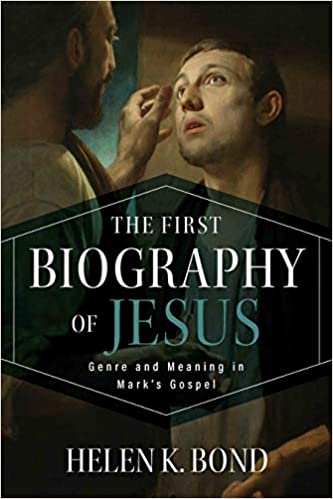BEN: Long ago, Charlie Moule stressed that the persistent use of the definite article before the phrase ‘Son of Man’ must be interpreted to refer to ‘the aforementioned (or well known) Son of Man (i.e. the famous one in Dan. 7). In other words, it’s unlikely to be an attempt at a modest self-reference, and Mk. 14.62 in particular was seen as making this finally quite clear with the reference to coming on the clouds. Given the eschatological and even at points apocalyptic character of Mark’s portrayal of Jesus, this seems to make good sense. While Mark in his redactional work wants to focus on Jesus as the Son of God, and the Christ, he feels compelled to report how Jesus alluded to himself in light of the figure in Dan. 7. Alan Segal in his book on The Two Powers in Heaven stresses that early Jewish speculation about Dan. 7, including in the Parables of Enoch and 4 Ezra, involved speculation about a person who had divine or quasi-divine status in various respects, who would rule forever at some point in the future, and be revered or even worshipped by all, bringing in God’s divine reign on earth. It seems to me that in Chapter 4 you don’t really come to grips with that fact that this is part of Mark’s portrayal of Jesus and I’m wondering why not? After all, Mark’s agenda is not merely to portray Jesus as a man who models various Greco-Roman virtues like modesty. Indeed, the whole tradition about him assuming and modeling being a servant or even a slave of others doesn’t really work with the Greco-Roman virtue list, much less Jesus dying a rebellious slave’s sort of death. Nor does Jesus’ emphasis on love of others, a quality remarkably absent in such virtue lists. Were Plutarch to read about Mark’s Jesus, I think he would have seen him as largely counter-cultural in various ways. How would you respond to this line of thinking?
HELEN:
Well of course the ‘Son of Man’ is one of the most complicated issues in gospel research! I was very keen here to distinguish between whatever the historical Jesus might have meant by the phrase (I assume some level of historical reminiscence here) and the use Mark puts it to within his literary work – the two might be identical, but they may well not be. It seems to me that by far the majority of scholars have tried to see behind Mark to the historical Jesus rather than simply looking at how the phrase functions for Mark. I don’t think Mark uses Son of Man as a title – quite the opposite, the Markan Jesus shuns lofty titles and the esteem of others in favor of stressing his ordinariness, his humanity. He can make claims for himself, but I don’t think this is one of them. The definite article gives the phrase a specificity – this person, Jesus – but I don’t think he is claiming to be a figure with ‘quasi-divine status’ (as you put it). But, as so often in Mark, there is a deeper level here, and readers who know Dan 7 – and who of course know that Jesus is God’s anointed Son – will immediately think of Daniel’s heavenly ‘son of man’. So in a way I’m suggesting that Mark can both have his cake and eat it: the phrase encapsulates Jesus’s self-deprecation and yet at the same time hints at his future glory (as 8.38, 13.26 and14.62 make clear).
No, I’m not at all suggesting that Mark is trying to shoehorn Jesus into a set of Roman virtues! Many of Jesus’ character traits would have been considered virtuous by Roman readers, e.g. his kindness to others, his benefactions, his modesty and restraint, his piety towards his father, but his teaching on self-denial and putting oneself last would have seemed hugely subversive and a challenge to the prevailing honor/shame culture that pervaded the Roman world. I don’t imagine Plutarch would have been terribly impressed by Jesus, but then I doubt that Mark is really trying to appeal to the Roman elite.













